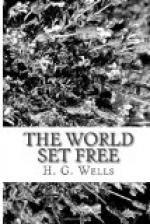’I do not think any of us felt we belonged to a defeated army, nor had we any strong sense of the war as the dominating fact about us. Our mental setting had far more of the effect of a huge natural catastrophe. The atomic bombs had dwarfed the international issues to complete insignificance. When our minds wandered from the preoccupations of our immediate needs, we speculated upon the possibility of stopping the use of these frightful explosives before the world was utterly destroyed. For to us it seemed quite plain that these bombs and the still greater power of destruction of which they were the precursors might quite easily shatter every relationship and institution of mankind.
’"What will they be doing,” asked Mylius, “what will they be doing? It’s plain we’ve got to put an end to war. It’s plain things have to be run some way. This—all this—is impossible.”
’I made no immediate answer. Something—I cannot think what—had brought back to me the figure of that man I had seen wounded on the very first day of actual fighting. I saw again his angry, tearful eyes, and that poor, dripping, bloody mess that had been a skilful human hand five minutes before, thrust out in indignant protest. “Damned foolery,” he had stormed and sobbed, “damned foolery. My right hand, sir! My right hand. . . .”
’My faith had for a time gone altogether out of me. “I think we are too—too silly,” I said to Mylius, “ever to stop war. If we’d had the sense to do it, we should have done it before this. I think this——” I pointed to the gaunt black outline of a smashed windmill that stuck up, ridiculous and ugly, above the blood-lit waters—“this is the end."’
Section 10
But now our history must part company with Frederick Barnet and his barge-load of hungry and starving men.
For a time in western Europe at least it was indeed as if civilisation had come to a final collapse. These crowning buds upon the tradition that Napoleon planted and Bismarck watered, opened and flared ’like waterlilies of flame’ over nations destroyed, over churches smashed or submerged, towns ruined, fields lost to mankind for ever, and a million weltering bodies. Was this lesson enough for mankind, or would the flames of war still burn amidst the ruins?
Neither Barnet nor his companions, it is clear, had any assurance in their answers to that question. Already once in the history of mankind, in America, before its discovery by the whites, an organised civilisation had given way to a mere cult of warfare, specialised and cruel, and it seemed for a time to many a thoughtful man as if the whole world was but to repeat on a larger scale this ascendancy of the warrior, this triumph of the destructive instincts of the race.
The subsequent chapters of Barnet’s narrative do but supply body to this tragic possibility. He gives a series of vignettes of civilisation, shattered, it seemed, almost irreparably. He found the Belgian hills swarming with refugees and desolated by cholera; the vestiges of the contending armies keeping order under a truce, without actual battles, but with the cautious hostility of habit, and a great absence of plan everywhere.




